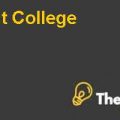Introduction
David Swensen a chief investment officer at Yale University and the investment department have to decide whether to proceed with the allocationof the bulk of endowment owned by the university in order to illiquid the investment or private equity or hedge funds and real estate. David Swensen and Dean Takashiwere hired and were responsible to manage the endowment of funds of the university. We explore the risk as well as benefits of different and effective asset allocation strategies, in addition to this, this dissertation also explores how to classify and organize the different assets, and the issues related to the allocation of the assets across the different sub-classes such as hedge funds, real estate and venture capital.
The university hasdecided to pioneer an effective and appealing approach to manage the endowment or assets rather than keeping the extensive proportion of assets or endowment in domestic bonds and equities. Over the period of initial years, Yale had madea small investment in significantly less efficient financial markets such as natural resources, real estate, absolute-return investment and private equity.
Yale University Investments Office February 2015 Harvard Case Solution & Analysis
Question # 01
The investment office was highlyresponsible for the matters of endowment or assets, it had to overlook the external advisors who tend to give advices regarding investment purposes. It has been recommended to Yale for the spending and investment policy by broadly discussing the issue ofhow the university would be assessing theinvestment in the forthcoming years and what would be the spending pattern over the period of time.
The investment office hasperformeda mean variance analysis through weighing risk and expected rate of return.Yale University has reached to the recommendation through evaluating specific returns, correlations, expected returns, expected returnsamongst the asset classes. The standard deviation of the private equity has resulted tobe 26.8% vs. 20%.
Yale has assessed the risk exposure and made several attempts through hiring external advisors for the purpose of managing the funds. However, Yale was not satisfied with the work or external advisors. In addition to this, the university had tried hard to manage the equity funds through other sources of funds. Yale has also estimated the recession and inflation rate per annum in the economy of United States, so Yale had contemplated to acquire those funds so that the operations of the university would be managed smoothly in the period when economy survives in the recession period. Moreover, Yale had been managing the funds in many areas of the world, seven managers were hired from which, one manager was responsible to manage funds in Europe and remaining six were confined to manage funds in other countries of the world. Even though the performance of the Yale Universitywas comparatively better than other universities all around the world, it was facing severe difficulties in managing funds in the financial markets and the recession period in the economy posed threats to the university due to which, the university was struggling in managing the operations as well. Yale pondered on three core principles which had to be practiced for the purpose of making effective investment decisions...............
This is just a sample partical work. Please place the order on the website to get your own originally done case solution.











